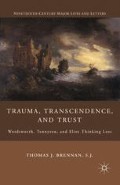Abstract
Near the end of Seminar VII: The Ethics of Psychoanalysis, Jacques Lacan comments on Freud’s essay “Mourning and Melancholia”:
In a famous article called “Mourning and Melancholia,” Freud also says that the work of mourning is applied to an incorporated object, to an object which for one reason or another one is not particularly fond of. As far as the loved object that we make such a fuss in mourning is concerned, we do not, in fact, simply sing its praises, if only because of the lousy trick it played on us by leaving us. Thus, if we are sufficiently cruel to ourselves to incorporate the father, it is perhaps because we have a lot to reproach this father with.1
Access this chapter
Tax calculation will be finalised at checkout
Purchases are for personal use only
Preview
Unable to display preview. Download preview PDF.
Notes
Jacques Lacan, Seminar VII: The Ethics of Psychoanalysis, ed. Jacques-Alain Miller, (New York: Norton, 1992), 307. All subsequent references to this seminar are noted parenthetically in my text by volume and page.
Leo Bersani, The Freudian Body: Psychoanalysis and Art, (New York: Columbia UP, 1986), 10.
Cathy Caruth, Unclaimed Experience: Trauma, Narrative and History, (Baltimore: Johns Hopkins UP, 1996), 91–112.
Sigmund Freud, The Standard Edition of the Complete Psychological Works of Sigmund Ereud, trans. James Strachey, vol. XIV, On the History of the Psycho-Analytic Movement, Papers on Metapsycholojjy and Other Works, (London: Hogarth, 1953), 243. All subsequent references to ”Mourning and Melancholia” correspond to this text and are noted parenthetically in my text by volume and page.
Thomas Pfau, Romantic Moods: Paranoia, Trauma, Melancholy, (Baltimore: Johns Hopkins UP, 2005), 324.
Jacques Lacan, Seminar XT. The Four Fundamental Concepts of Psychoanalysis, ed. Jacques-Alain Miller, (New York: Norton, 1977), 25. All subsequent references to this seminar are noted parenthetically in my text by volume and page.
Joan Copjec, Read My Desire: Lacan Against the Historicists, (Cambridge: MIT P, 1994), 148.
Slavoj Zizek, The Sublime Object of Ideology, (London: Verso, 1989), 157.
Lacan, Seminar I: Freud’s Papers on Technique, (New York: Norton, 1975), 34. The reference to the Wolfman’s dream is found in Freud, Standard Edition, vol. VII, On Infantile Neurosis and Other Works, 36–38.
Melanie Klein, The Writings of Melanie Klein, vol. I, Love, Guilt and Reparation and Other Works, 1921–1945, (New York: The Free P, 1984), 356. All subsequent references to “Early Stages of the Oedipus Conflict” (1928), “The Importance of Symbol Formation in the Development of the Ego” (1930), “A Contribution to the Psychogenesis of Manic Depressive States” (1935), “Love, Guilt, and Reparation” (1937), and “Mourning and its Relation to Manic Depressive States” (1940) are noted parenthetically in my text with the date and page.
Judith Butler, “Moral Sadism and doubting one’s own love: Kleinian reflections on Melancholia,” in Reading Melanie Klein, ed. John Phillips and Lyndsey Stonebridge, (London: Routledge, 1998), 181.
Robert D. Hinshelwood, “Transference and Counter-Transference,” in The Klein-Lacan Dialogues, ed. Bernard Burgoyne and Mary Sullivan, (London: Rebus P, 1997), 136.
Alfred, Lord Tennyson, In Memoriam, ed. Susan Shatto and Marion Shaw, (Oxford: Clarendon, 1982), section 21, lines 21–24. All subsequent references are indicated parenthetically by section number and line number within my text.
William Wordsworth, “Elegiac Stanzas Suggested by a Picture of Peele Castle in a Storm, painted by Sir George Beaumont,” in The Cornell Wordsworth, ed. Stephen Parrish and others; Poems in Two Volumes and Other Poems, 1800–1807, ed. Jared Curtis, (Ithaca: Cornell UP, 1983), 268, lines 37–40. All subsequent references to this poem correspond to this text and are noted parenthetically and by line number in my text.
T. S. Eliot, The Complete Poems and Plays: 1909–1950, (New York: Harcourt Brace, 1980), 47, lines 328–330. Subsequent references to The Waste Land are referred to by line number in my text. References to “Sweeney Among the Nightingales” and to “Hysteria” are referred to by page number from The Complete Poems and Plays in my text.
Petar Ramadanovic, Forgetting Futures: On Memory, Trauma and Identity, (Lanham, MD: Lexington Books, 2001), 73.
Copyright information
© 2010 Thomas J. Brennan, S.J.
About this chapter
Cite this chapter
Brennan, T.J. (2010). Introduction: Traumatized Trust. In: Trauma, Transcendence, and Trust. Nineteenth-Century Major Lives and Letters. Palgrave Macmillan, New York. https://doi.org/10.1057/9780230117549_1
Download citation
DOI: https://doi.org/10.1057/9780230117549_1
Publisher Name: Palgrave Macmillan, New York
Print ISBN: 978-1-349-28942-4
Online ISBN: 978-0-230-11754-9
eBook Packages: Palgrave Literature CollectionLiterature, Cultural and Media Studies (R0)

